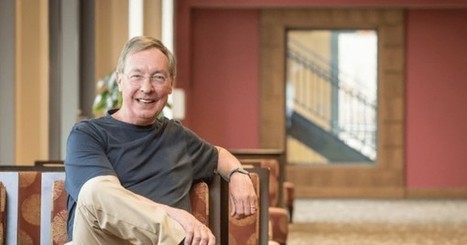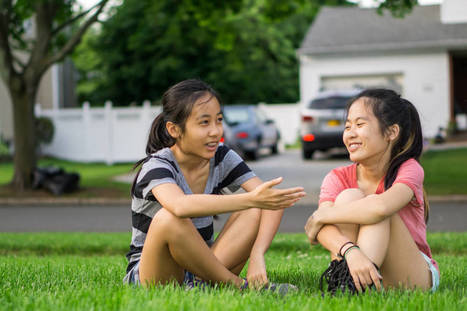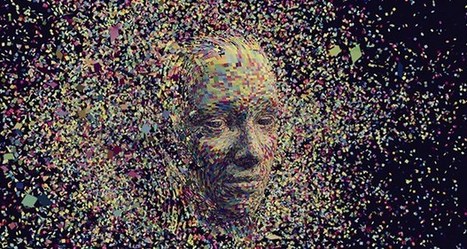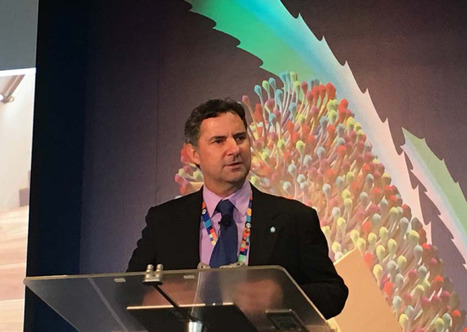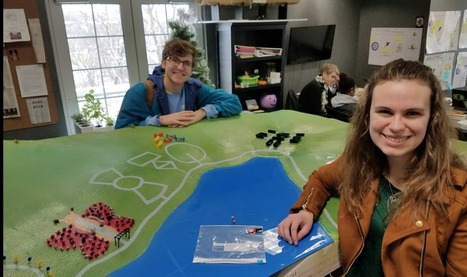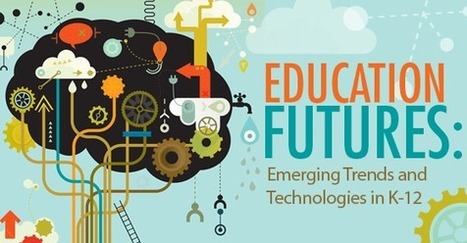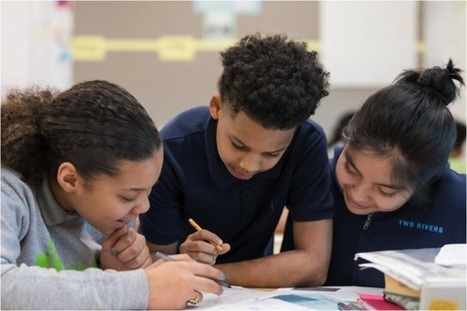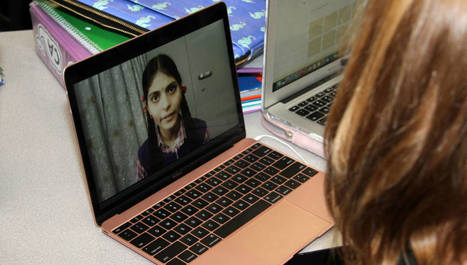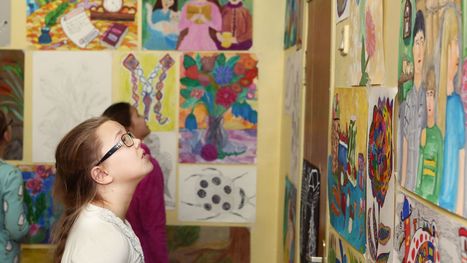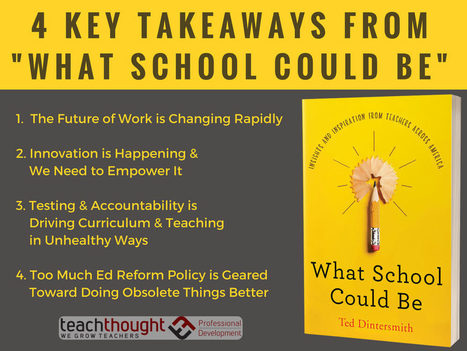 Your new post is loading...
 Your new post is loading...
Addressing the valid concerns teachers have about new tech tools helps them accept change and builds positive relationships.
Rethinking educational systems and curriculums to ensure today’s students gain the skills that will equip them for a rapidly changing labor market is thus essential. Some places have already begun: The Canadian province of Ontario is training its young people in critical thinking, communication, creativity, collaboration, and entrepreneurship. Even China is making a push to incorporate creativity into its notoriously rote curriculum.
While Washington, D.C. slams accreditors for not holding colleges and universities accountable for their student outcomes, the more insidious failure of accreditation is the stifling effect on innovation at existing institutions.
Three case studies from a new paper that I coauthored with my colleague Alana Dunagan that was published originally as a chapter in the new book Accreditation on the Edge: Challenging Quality Assurance in Higher Education illustrate why.
“If we trust teachers with the lives of our children, shouldn’t we trust them with a lesson plan?”
An alternative approach to Design Thinking that balances the traditional design process with collaboration
We need to turn up the volume of the “black room” ideation and design process where skilled practitioners are trusted to develop their ideas, combined with a healthy balance of collaboration and iteration. New ideation is vital. We need to break out of what people expect, and surprise them with something much better. Innovation happens with deep problem solving and design skills that are allowed time, talent, testing and iteration to mature.
But what now? Information is everywhere, making it impossible to package. Collaboration and networking underpin life, and constant communication is the norm, even for plants. Each time you check your smart phone you tap into a global brain. And when you finally put down the phone, you shake your head: So much going on. In fact, the tightening weave in the global network means that never has there been an era in human history in which so many people learn together.
The rapid and exponential growth of the internet over the past 40 years has changed the nature of society. Indeed, at the end of the first two decades of the twenty-first century, the internet is our defining medium. This has implications for student learning and, consequently, teacher pedagogy.
‘C’ is for collaboration and commercialisation: two things Australia is miserably failing in, even though our science and research is top notch, according to the OECD. So, where are we going wrong?
According to CSIRO’s likeable chief executive Larry Marshall, Australia’s current collaboration and commercialisation levels can be blamed on the lack of alignment between scientists, universities, businesses, and government.
BIG finds projects in three main ways: businesses or organizations come asking to collaborate, teachers develop projects and find partners interested in collaborating, and students initiate projects. “The kids’ ideas are just as good as the adults' ideas,” Cornally said.
“We are excited when a kid has an idea because half the time they’re good and half the time they’re bad, but it’s the same as the adults.” No matter how the project comes to them, Cornally said teachers work to think it through, flesh it out and make sure it’s a viable project. If it is, it gets added to a custom-built database that students can browse when they shop for projects at the start of the semester.
This article presents a new framework for unobtrusive observation analytics of knowledge and skills-in-action through continuous collection of data from individuals while they interact with digital assets either as individuals or on problem-solving teams. The framework includes measures of the skill and knowledge areas of collaboration, creativity, personal learning, problem solving, and global sustainability, which are observed during natural production and use of communications, intentional artifacts, and resources in a digital learning space designed for self-directed and team-based learning challenges. The article describes the digital context for data collection and shows some example data and analyses.
From the research, the authors pointed to eight key elements that can help make new staffing models a success. They include providing:
differentiated roles for educators, like teacher-leaders, collaborating teachers, support staff, and teachers-in-training;
intensive collaboration on small teaching teams;
cultures of intensive coaching;
paid fellowships and residencies that enabled schools to build their own pipeline of future educators;
school leaders who reinforce high standards;
educator schedules that allow for school-day collaboration and coaching;
higher compensation for teachers and teacher-leaders at many schools, within existing budgets;
facilities created or adjusted—generally not at great expense—to support team teaching.
VISION
To future-proof the education system, creating opportunities and improving outcomes for young people.
OUR BOLD GOAL
By 2030, all young Western Australians will have access to educational opportunities that equip them with the knowledge, skills and values necessary to thrive in a global society.
Many themes focusing on innovation in higher education emerged from Arizona State University's research center conference hosted by EdPlus.
|
Nesta's study of 41 million job adverts reveals not all digital skills will be equally valuable in the future and creativity is key
If your goal is to engage and educate students to the greatest extent possible, you need to consider the benefits of an innovative classroom. An innovative classroom will possess several key traits
In sum, all our efforts to improve education come down to expanding the impact possibilities frontiers of our schools, primarily through innovations that amplify great teaching. This concept is directly relevant to the shortcomings of the Gates Foundation’s teacher evaluation initiative. One of the main takeaways from the RAND study was that teacher evaluation reforms demanded too much time. Unless schools receive a major increase in recurring funds to pay for more staff hours, innovation is the only way to free up the staff hours needed for teacher evaluations. You can’t expand a school’s impact possibilities frontier by just expecting people to work harder. You need innovation to help them work smarter.
"It's important to distinguish between teaching someone a subject and helping them learn like an expert in the field. Should our kids study history facts, or learn to think like a historian? Memorize science definitions, or learn to think like a scientist? Answer canned questions about a poem, or learn to think like a literature critic?"
Enabling students to become leaders in their own learning is the greatest gift an educator can offer. In today's race, project-based learning schools are giving our students the very best training they need to succeed.
“The idea of an average person in a standardized world has run its course,” claims Rose. “But we’re so accustomed to thinking in this way [in terms of averages], we forgot it’s just made up.”
But doing away with the average — convincing teachers to focus on their students as individuals, each with his or her unique learning profiles, rather than lump them together into a unified lesson plan — isn’t an overnight operation. Deep shifts in thinking, both individually and culturally, are historically slow. “The immediate rewards are actually few and far between,” admits Rose. “This really is the long game.”
Many schools are moving to project-based learning as a way to help students make meaning about content in deeper and more lasting ways than a lecture can provide. While those goals are clear to educators, and inspiring examples of schools successfully implementing the pedagogy exist, it can still be a challenging shift for many teachers. It is difficult to design projects that both help students learn required content and that genuinely interest them. Some educators are finding that connecting projects to a global community is a powerful way to make a project feel meaningful to students.
In April 2018, the Online Learning Consortium published The State of Innovation in Higher Education: A Survey of Academic Administrators. The report surveyed over 100 college and university administrators to gain insight into the drivers of and barriers to innovation in American institutes of higher education. In this interview, Jill Buban provides insight into the study’s findings, and outlines how colleges and university can define and employ innovation on campus, today and in the future.
California high schools encourage students to use online video games to learn science, technology, engineering and math – and a variety of soft skills as well.
Fifth graders from Sherman Elementary School in Tacoma, Washington, spent much of the 2017–18 school year investigating the health of the Salish Sea. As part of an interdisciplinary STEAM (science, technology, engineering, arts, and math) project, they conducted fieldwork and interviewed experts to learn about the coastal ecosystem that is literally in their backyard. To advocate for protections of this rich natural resource, they hosted an education night at a museum that sits on the waterfront.
“Sharing their projects with the wider community makes learning more real,” says teacher Julanne Boyd. Since Sherman Elementary adopted project-based learning as a key instructional strategy three years ago, students have gotten used to presenting to public audiences. And teachers have gotten bolder about taking student work outside the classroom. “At first, we were sharing just with our families. More and more, our students want to be out in the community,” says Boyd.
Too Much Ed Reform Policy is Geared Toward Doing Obsolete Things Better
The ecosystem of education is complex and I often tell teachers and leaders that moving one part of the puzzle can help you move another. That said, what is expected of teachers often puts them in a bind. So many teachers want to, and are trying to, teach differently but often at the risk of coming under fire from leadership or feeling like they’re letting students (or parents) down by not “covering content”.
If we know this world will require a new set of skills, or at least being better at a set of skills that were previously less emphasized, then we have to move past the short-sightedness of most recent reform efforts.
The moral imperative to shift education’s purpose, practice, curriculum, and systems has never been more clear. What could school be if we reimagined it with this quote from the book in mind, “Our children should study what’s important to learn, not what’s easy for you to test.”
Last month, the Christensen Institute co-hosted the annual Blended and Personalized Learning Conference with the Highlander Institute and The Learning Accelerator in Providence, Rhode Island. Prior to the main conference, we held a 2-day Advanced Practitioner Summit during which on-the-ground experts joined in discussions around problems of practice and emerging tactics to solve for them.
AI terrifies a lot of people.
From superintelligent puppet masters taking over the world, to fiery self-driving car crashes, to the coming age of killer machines, more and more the rise of AI seems like a chilling Black Mirror episode.
|

 Your new post is loading...
Your new post is loading...
 Your new post is loading...
Your new post is loading...






